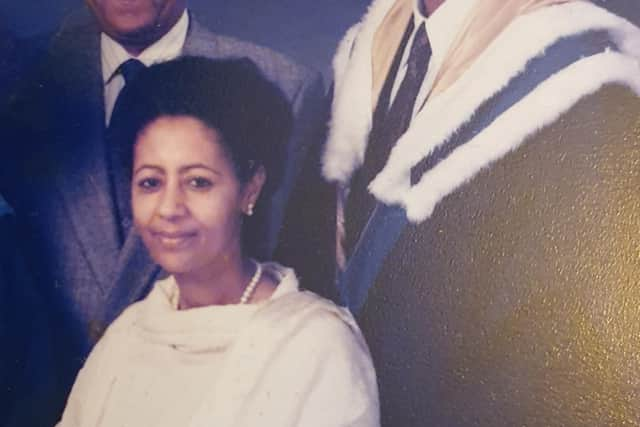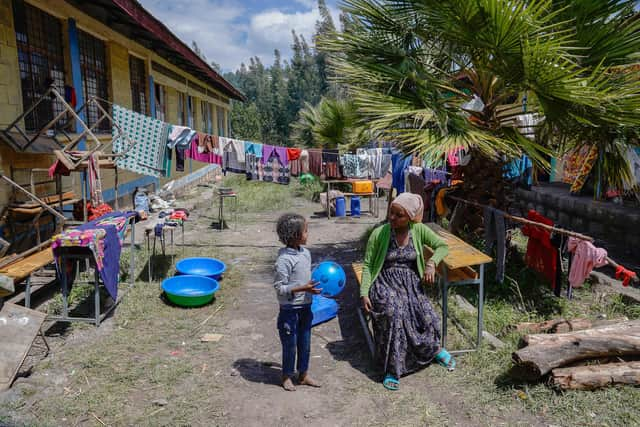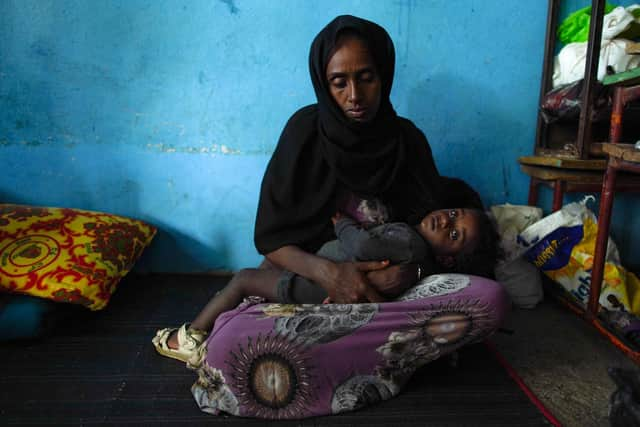COP26: Why an Ethiopian who studied in Scotland is coming back to speak for a continent
Countries in Africa are already experiencing devastating effects from rising global temperatures, with increasing heatwaves, floods, droughts and wildfires and a rising threat from agricultural pests and diseases.
But they can anticipate much worse.
Climate scientists have ranked the continent more vulnerable than any other region to the world's changing weather patterns.
Advertisement
Hide AdAdvertisement
Hide AdDemissie Asafa Demissie, now 56, spent his formative years in Scotland, boarding at Keil School in Dumbarton before going on to study engineering at the University of Strathclyde.
These days he is married and a father of four, and has been working as a management consultant in Addis Ababa for the past 20 years.
But this week he has made the journey back to Scotland at his own expense to make an impassioned plea on behalf of all Africans.
He is leading a campaign, Africa Is Burning, demanding the world’s richest nations make the necessary cuts to greenhouse gas emissions and pay up cash promised to protect communities on the frontline of climate breakdown.


He felt driven to launch the initiative during lockdown, after reading an article about business, finance and investment.
In it the environmental crisis was touted as a massive “opportunity”, the biggest since the invention of the internet, with the scale of investment needed to decarbonise the planet estimated at more than £22 trillion.
“I thought, wow,” he said.


"But at the same time it was difficult to comprehend since what I was actually seeing was the devastation that global warming was causing in Africa.
“Africa is going through this vicious circle of poverty through drought, famine, locusts, war, coups and corruption, while this pin-striped dude is prophesying a gold rush.”
Advertisement
Hide AdAdvertisement
Hide AdHe decided to study global warming in greater detail and spent months during the pandemic doing “a proper deep-dive look” at the science, the impacts and what was being done about it.
He said: “When it comes to Ethiopia, 85 per cent of the 100-million-plus population is dependent on agriculture.


“And that's almost all of it rain-fed agriculture. Can you imagine what this means?
“Every time the rains are late, or don't show up at all, people starve.”
“There are millions of people – around 10 per cent of the population – who are food-insecure and vulnerable, year in year out.
"They are willing but can't grow enough, or any, food for their families.
“This is not only because the rains have become unreliable but because of soil degradation. The topsoil has literally been washed away forever.”


The situation is magnified by conflict in the country.
“Some people might say governments should do something about it instead of spending money on wars,” he said.
Advertisement
Hide AdAdvertisement
Hide Ad“True. But some people say that the droughts themselves are the reason for conflict.
“Then you have African leaders who are busy filling up their own pockets rather than investing in their people.
“And add on top of all this the donor community, which thinks they know better, then it is like trying to douse fire by pouring oil on it.
“Right now in Ethiopia there are an additional four million people displaced due to drought and conflict.
“War in the north has exacerbated the already famine-like situation and there are an additional five million in need of humanitarian aid.
“A total of 18 million people – 20 per cent of the population – are directly impacted by climate change and all the conflict and wars it brings with it.”
Activist group Extinction Rebellion was also a source of motivation for Demissie when launching the Africa Is Burning campaign.
He said: “What inspired me about them was their willingness to risk their comfortable lives and professions with arrest, criminal record or even worse for something that will impact families they have never met or known in faraway places like Africa.”
Advertisement
Hide AdAdvertisement
Hide AdDemissie is not an official delegate at COP26 but he is set to deliver a powerful speech in Glasgow tomorrow, broadcast on live-streamed news and information channel COP26.tv.
“Unfortunately, the leaders of Africa have failed their people entirely,” he said.
“Their negotiators have aligned themselves according to what their donors demand and are busy selling the people of Africa short.
“The leaders, some of whom here at COP26, are waiting for handouts from the $100 billion pledged to them. But most of the money will not go to Africa, as usual.
“If Africans cannot rely on their leaders to look after their interests and their negotiators are otherwise busy, then African people themselves should fight for their survival and future.
“Because the impact of global warming has already reached critical levels in Africa, there is no other option but to try to recover and rebuild the continent.
“Who should fund this kind of program? And how can it be justified? How will the funding be enforced? That is what my speech at COP26 is all about.”
As well as highlighting the campaign, Demissie is also excited to be back on Scottish turf after three decades.
“Scotland is like my second home,” he said.
Advertisement
Hide AdAdvertisement
Hide Ad“Some of my lifetime friends I met during my time in Scotland.
“It’s where I grew up, arriving as a teenager to become a man, and I hope I have inherited some of the better characteristics of the Scots people – like fairness, no-nonsense attitude and maybe a bit of their sense of humour.”
A message from the Editor:
Thank you for reading this article. We’re more reliant on your support than ever as the shift in consumer habits brought about by coronavirus impacts our advertisers.
If you haven’t already, please consider supporting our trusted, fact-checked journalism by taking out a digital subscription.
Comments
Want to join the conversation? Please or to comment on this article.
